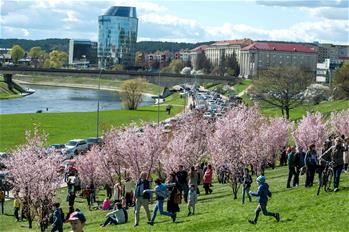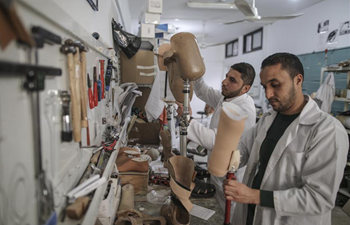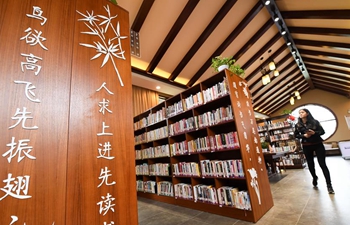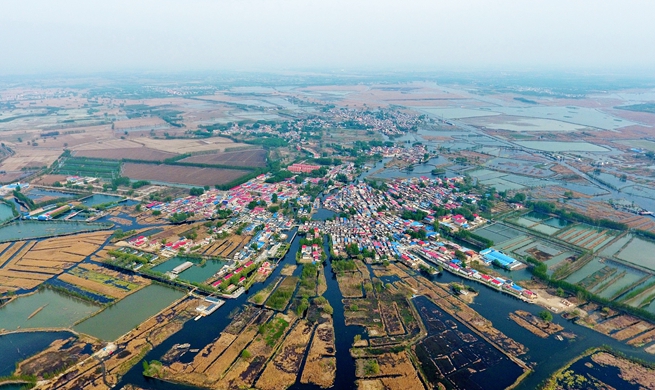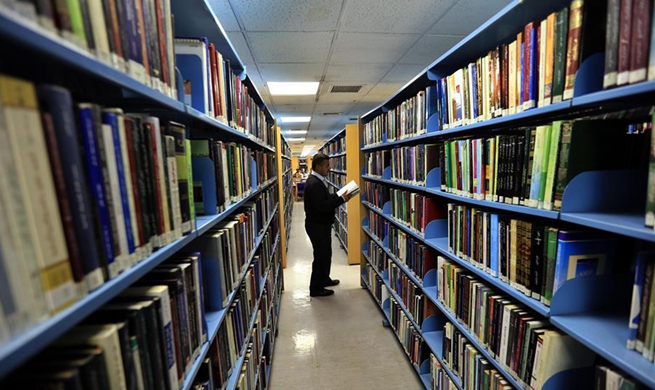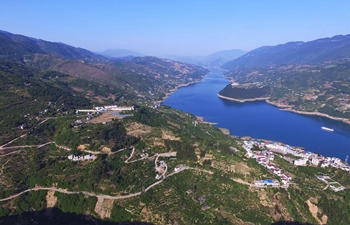ANKARA, April 23 (Xinhua) -- As Turkey braces for snap election in June, which will shift the country from a parliamentary system to a presidential one, leading candidate President Recep Tayyip Erdogan could face complications if he decides to campaign in European countries.
"I will be present in a meeting of an international organization in a stadium of 10 to 11 thousand people, and I will address my citizens there," said Erdogan in an interview at the weekend with private NTV broadcaster.
The Turkish head of state did not say which European country he was planning to visit during his tight election campaign schedule.
In a sudden change of heart, according to experts, to get ahead of a looming economic emergency, Erdogan called snap legislative and presidential elections on June 24, bringing the polls forward by a year and a half before the initial date in November 2019, in order to swiftly strengthen his power.
Several European countries, such as Austria and the Netherlands, have announced that they would not welcome any possible campaigning on their lands for Turkish diaspora who live there.
Other countries are also expected to follow that approach, according to observers.
During the interview, Erdogan criticized Austria for planning to ban any possible campaign for the upcoming elections, saying that countries which attempt to undermine Turkey's democratic process would "pay a price."
Erdogan especially took aim at Austrian Chancellor Sebastian Kurz, who said campaign events would "not be welcomed" and not be allowed.
Erdogan said steps taken by Kurz would "entirely turn against him," and "Turkey's struggle for democracy cannot be easily restricted."
The early election will accelerate the transition to a new presidential system which arouses critics' concern of leading the way for one-man rule.
German Foreign Minister Heiko Maas has announced that his country will not allow Turkish politicians to carry out election campaign rallies, adding that Berlin had brought in a series of legal arrangements prohibiting political rallies for foreign politicians after the Turkish April 2017 referendum.
"Our attitude regarding the matter is clear. In the three-month period ahead of elections in a foreign country, politicians will not be authorized to carry out election campaigns in Germany," Maas told reporters at a meeting as part of the G7 Summit being held in Toronto, Canada.
"The struggle over the upcoming elections in Turkey should take place in Turkey, not in Germany," said Annegret Kramp-Karrenbauer, General Secretariat of Angela Merkel's Christian Democratic Union.
Dutch Prime Minister Mark Rutte also said that campaigning in the Netherlands would be "undesirable."
Ahead of the referendum in Turkey last year, Dutch authorities actively intervened to prevent a Turkish minister from reaching a consulate in Rotterdam to address Turks living there, leading to a diplomatic crisis.
Turkey's EU Affairs Minister Omer Celik also blasted the Prime Ministers of Austria and the Netherlands, saying they were "not leaning on democratic values."
"With this approach, Austria and Holland are poisoning democratic values in their own countries. By doing so, they are helping spread of racist political movements hostile to EU values," he wrote on Twitter.
Experts argue that President Erdogan, who is also the leader of the ruling Justice and Development party (AKP) governing Turkey for nearly 16 years, may face problems in campaigning in Western European countries because of bad blood since the 2017 constitutional referendum.
"The question is whether the ruling party and presidential candidate are planning campaigns in countries such as Germany, the Netherlands, Austria, Belgium, France and Denmark, where sizeable Turkish communities live," told political commentator Serkan Demirtas to Xinhua.
More than 1.4 million Turks living abroad of the nearly 3 million eligible voters overseas voted in April 2017 referendum. Some 59.1 percent of them voted in favor of constitutional amendments, around eight points higher than domestic voters.
The government is reportedly working on a new regulation to ease the condition for Turks living abroad to vote, in a bid to increase turnout as figures show that a solid majority still support Erdogan and the ruling AKP.
The June elections are critical and historical because the winner of the presidential vote will have unprecedented powers since the foundation of the Turkish Republic in 1923 by Mustafa Kemal Ataturk.
According to European observers, Germany is unlikely to respond to Erdogan's calls for a presidential visit to Berlin before the June 24 polls, and French President Emmanuel Macron is also unlikely to be welcoming to his Turkish counterpart under these circumstances.
These countries have been very critical of the state of emergency declared after the botched 2016 coup in Turkey which is still in effect.
"We have several millions of voters in Europe who would want to see their leaders address them before the elections. A way must be found in this purpose," said an AKP official to Xinhua, speaking on condition of anonymity.






